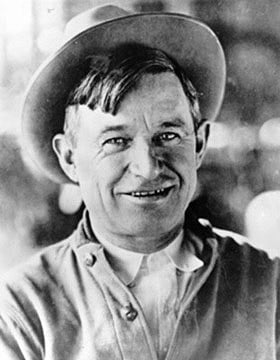I knew the device long before I knew the device’s name. "Paraprosdokian" comes from Greek "παρά", meaning "against" and "προσδοκία", meaning "expectation." A paraprosdokian is a figure of speech used to describe an observation, framed in a phrase or a sentence or sentences, in which the ending is surprising or unexpected in a way that causes the reader to reframe or reinterpret the observation as a whole. A classic example is: “I want to die peacefully in my sleep, like my grandfather; not screaming and yelling like the passengers in his car.” Another is: “The last thing I want to do is hurt you. But it’s still on the list.”
Sometimes the basis for a paraprosdokian relies on a word that can have two meanings. Generally these can be completed with the phrase “you can say that again.”
- Prime Minister: “Your highness, the peasants are revolting.” King: “You can say that again.”
- Wife: “You have to admit that my parents are trying.” Husband: “You can say that again.”
 |
| Will Rogers |
Among politicians, Winston Churchill was probably best known for relying on paraprosdokia to make a point. Among his classic observations are:
- There but for the grace of God -- goes God.
- A modest man, who has much to be modest about.
- If you are going through hell, keep going.
- It has been said that democracy is the worst form of government, except for all the others that have been tried.
- You can always count on Americans to do the right thing - after they've tried everything else.
Probably the consummate expert in Paraprosdokia was Groucho Marx. At one time or another Groucho uttered all of the following:
- I've had a perfectly wonderful evening, but this wasn't it.
- Time flies like an arrow; fruit flies like a banana. (This one gets my "best in show" award!)
- Outside of a dog, a book is man's best friend. Inside of a dog it's too dark to read.
- When you're in jail, a good friend will be trying to bail you out. A best friend will be in the cell next to you saying, 'Damn, that was fun.’
- From the moment I picked your book up until I laid it down, I convulsed with laughter. Someday I intend on reading it.
- The secret of life is honesty and fair dealing. If you can fake that, you've got it made.
- I have nothing but respect for you -- and not much of that.
- She got her looks from her father. He's a plastic surgeon.
- For that act alone the defendant should get ten years in Levenworth, or eleven years in twelveworth, or five and ten in the Woolworth.
- Get out of my life. You can leave in a taxi and if you can’t find a taxi you can leave in a huff. And if you need more time, make it a minute and a huff.
- When love comes in the door, money flies out the innuendo.
- I asked God for a bike, but I know God doesn't work that way. So I stole a bike and asked for forgiveness.
- Do not argue with an idiot. He will drag you down to his level and beat you with experience.
- Going to church doesn't make you a Christian any more than standing in a garage makes you a car.
- Light travels faster than sound. This is why some people appear bright until you hear them speak.
- If I agreed with you, we'd both be wrong.
- War does not determine who is right - only who is left.
- Knowledge is knowing a tomato is a fruit; Wisdom is not putting it in a fruit salad.
- Evening news is where they begin with 'Good evening' and then proceed to demonstrate why it isn't.
- How is it one careless match can start a forest fire, but it takes a whole box to start a campfire?
- Why is it wrong to use a handicapped parking space but all right to use a handicapped bathroom stall?
- I didn't say it was your fault; I said I was blaming you.
- Why do Americans choose from just two people to run for president and 50 for Miss America?
- In totalitarian countries there is complete freedom of speech – you can say anything that you want to. Once.
- When tempted to fight fire with fire, remember that the Fire Department usually uses water.
- When tempted to “split the baby,” remember that this was precisely what Solomon avoided doing.
- To be sure of hitting the target, shoot first and call whatever you hit the target.
- Life isn’t what it used to be. And it never was.
- Change is inevitable, except from a vending machine.
To steal ideas from one person is plagiarism. To steal from many is research.
(Be sure to click the link for a rousing send-off!)

















 Thursday, 5 April saw a shooting during a
Thursday, 5 April saw a shooting during a 








